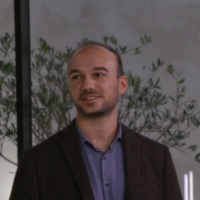The organisation will edit an electronic book of abstracts, available for free and have a Digital Object Identifier (DOI) for permanent tracing. The proceedings will further comprise links for the video presentations and for the full text of the dissertations.
2024
BIM A+ International Conference
Programme
2 October 2023
| 11:15 | 11:30 | Opening session |
| 11:30 | 12:55 | Session 1 |
| 11:30 | 12:10 | Invited speaker - Arlind Dervishaj Frameworks, Digital Tools, and Climate Benefits of Concrete Reuse in New Buildings Researcher KTH Royal Institute of Technology |
| 12:10 | 12:30 | SCAN to BIM for Bridges: Extraction of Geometric Properties for Engineering Analysis Tina Ojage Agbor |
| 12:30 | 12:50 | IDS in Open BIM Workflow: Potential & Limitations Petr Šimánek |
| 12:55 | 14:30 | Lunch |
| 14:30 | 15:55 | Session 2 |
| 14:30 | 14:50 | Development and Practical Application of Digital Twins Felip Wang |
| 14:50 | 15:10 | Leveraging BIM for Public Works Execution and Accounting Optimization: BIM modelling and QTO for tender cost estimation Shobhit Suthar |
| 15:10 | 15:30 | Workflow for Implementing Energy Analysis Across a BIM Design Lifecycle Sara Antunes |
| 15:30 | 15:50 | Digital Twin Interface for Facility Management Using openBIM Standards Isadora Renata Bernardon Almeida |
| 15:55 | 16:30 | Coffee break |
| 16:30 | 17:55 | Session 3 |
| 16:30 | 16:50 | Enhanced BIM Requirements for Quantity Take-Off: A Framework for Definition, Validation, and Application. Pedro Alberto Serrano Sosa |
| 16:50 | 17:10 | Towards a process of public tendering with automatic QTO for increased comparability of proposals: a prototype Guido Coutinho de Alvarenga |
| 17:10 | 17:30 | Creation and Implementation of BIM Model Measurement Rules Mohammad Asim |
| 17:30 | 17:50 | Bridging Realties: Advancing Modular Construction through BIM and Mixed Reality Integration Ankita Maurya |
3 October 2023
|
||
| 09:50 | 10:55 | Session 4 |
| 09:50 | 10:10 | Extracting machine-readable constructive element precedence from BIM models André Luis Mantelatto Lisboa da Silva |
| 10:10 | 10:30 | Digital Building Permit: analysis and creation of rules to automate the process Jessica Aida Pereira da Silva |
| 10:30 | 10:50 | Automation Possibilities of Requirements Checking for Digital Building Permits Issuing when introducing IFC standard Anshika Karn |
| 10:55 | 11:30 | Coffee break |
| 11:30 | 12:55 | Session 5 |
| 11:30 | 11:50 | BIM-based design validation for Fire Stations Ingrid Alexia Silverio Freire |
| 11:50 | 12:10 | Strategies for using BIM in assessment and monitoring of large steel structures. Application to a sports hall. Khalid Kuba |
| 12:10 | 12:30 | Digital twin for existing buildings Margaux Torrelle |
| 12:30 | 12:50 | From BIM to FEM: An ANSYS Case Study Collins Lemashon Sarisar |
| 12:55 | 14:30 | Lunch |
| 14:30 | 15:55 | Session 6 |
| 14:30 | 14:50 | Management of Information In BIM Models : Open BIM Workflow and Practical Applications Idriss Tchaheu Tchaheu |
| 14:50 | 15:10 | Cross-Country Analysis of BIM Enforcement by the Public Sector Luis Felipe Zuluaga Mosquera |
| 15:10 | 15:30 | BIM Implementation Guide: Challenges And Impacts in Organisations Lara Louise Raulino Jacome |
| 15:30 | 15:50 | The Value of BIM for Owners: A multi-stakeholder study focused on an office building Aline Hilgemberg da Costa |
| 15:55 | 16:30 | Coffee break |
| 16:30 | 17:55 | Session 7 |
| 16:30 | 16:50 | IFC-Based Schedule Optimization Melody Wanjiku Njuguna |
| 16:50 | 17:10 | Information Modelling for Building Automantion: towards for the integration of BIM tools in Robotic Fabrication and 3DCP process Adriano Aparecido Franchini |
| 17:10 | 17:30 | Design of Kinetic Building Envelope of a High-performing Building using BIM Mouadh Khammassi |
| 17:30 | 17:50 | Efficient Planning and Execution of Solar Panels using BIM 4D with Line of Balance schedule Felipe de Oliveira Leite |
| 17:55 | 18:10 | Closing session |

Arlind is an architect and PhD candidate at KTH. His recent work focuses on reusing concrete from existing buildings in new projects, daylighting, regenerative design, and circular economy in the built environment. He employs digital technologies, such as computational design, building information modeling (BIM), and simulations, to drive the transition of the built environment towards a more sustainable future. Arlind has presented his work at prestigious venues, such as ETH Zurich, Daylight Academy, Illuminating Engineering Society (IES), eCAADe, IBPSA, EC3 & CIB, and Velux Daylight Symposium.
Arlind is actively involved in teaching activities at KTH and contributes to ReCreate, an EU-funded project focused on reusing precast concrete for a circular economy. Before joining KTH, Arlind worked in Finland, leading computational design initiatives at ARCO Architecture Company in Helsinki.